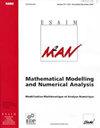On strictly convex entropy functions for the reactive Euler equations
IF 1.9
3区 数学
Q2 Mathematics
Esaim-Mathematical Modelling and Numerical Analysis-Modelisation Mathematique et Analyse Numerique
Pub Date : 2023-08-10
DOI:10.1051/m2an/2023067
引用次数: 0
Abstract
Abstract. This work is concerned with entropy functions of the reactive Euler equations describing inviscid compressible flow with chemical reactions. In our recent work [40] we point out that for these equations as a hyperbolic system, the classical entropy function associated with the thermodynamic entropy is no longer strictly convex under the equation of state (EoS) for the ideal gas. In this work, we propose two strategies to address this issue. The first one is to correct the entropy function. Namely, we present a class of strictly convex entropy functions by adding an extra term to the classical one. Such strictly entropy functions contain that constructed in [40] as a special case. The second strategy is to modify the EoS. We show that there exists a family of EoS (for the nonideal gas) such that the classical entropy function is strictly convex. Under these new EoS, the reactive Euler equations are proved to satisfy the conservation dissipation conditions for general hyperbolic relaxation systems, which guarantee the existence of zero relaxation limit. Additionally, an elegant eigen-system of the Jacobian matrix is derived for the reactive Euler equations under the proposed EoS. Numerical experiments demonstrate that the proposed EoS can also generate ZND detonations. Extension of the present results to high dimensions is direct.反应性欧拉方程的严格凸熵函数
摘要本文研究了具有化学反应的无粘可压缩流动的反应性欧拉方程的熵函数。在我们最近的工作[40]中,我们指出,对于这些方程作为双曲系统,在理想气体的状态方程(EoS)下,与热力学熵相关的经典熵函数不再是严格凸的。在这项工作中,我们提出了两个策略来解决这个问题。第一个是修正熵函数。也就是说,我们通过在经典熵的基础上增加一个额外的项,给出了一类严格凸熵函数。这种严格的熵函数包含[40]中构造的熵函数作为一种特殊情况。第二个策略是修改EoS。我们证明存在一组EoS(对于非理想气体),使得经典熵函数是严格凸的。在这些新的方程组下,证明了反应性欧拉方程满足一般双曲松弛系统的守恒耗散条件,从而保证了零松弛极限的存在。在此基础上,推导出反应性欧拉方程雅可比矩阵的优雅特征系。数值实验表明,该方法也能产生ZND爆轰。将所得结果直接推广到高维。
本文章由计算机程序翻译,如有差异,请以英文原文为准。
求助全文
约1分钟内获得全文
求助全文
来源期刊

CiteScore
2.70
自引率
5.30%
发文量
27
审稿时长
6-12 weeks
期刊介绍:
M2AN publishes original research papers of high scientific quality in two areas: Mathematical Modelling, and Numerical Analysis. Mathematical Modelling comprises the development and study of a mathematical formulation of a problem. Numerical Analysis comprises the formulation and study of a numerical approximation or solution approach to a mathematically formulated problem.
Papers should be of interest to researchers and practitioners that value both rigorous theoretical analysis and solid evidence of computational relevance.
 求助内容:
求助内容: 应助结果提醒方式:
应助结果提醒方式:


